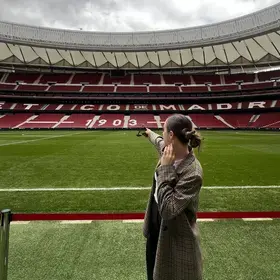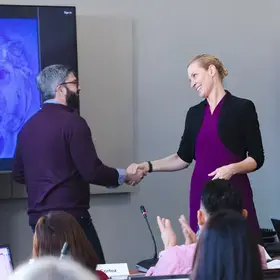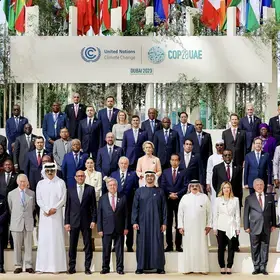Growing up in Southern California, Alyssa Ramirez could see the devastating impacts of climate change from up close—as a kid, she recounts one memory when she awoke to a sky painted “apocalyptic” orange by the glow of a nearby wildfire. After majoring in business as an undergrad and going on to work in human resources, that long-standing concern for the environment, along with a call to public service, led Ramirez to the Ecology, Evolution and Environmental Biology Certificate (E3B) program at Columbia.
She spoke recently about her experience in the program, her May 2020 graduation, and her future plans pursuing a Master’s in Public Administration in Environmental Science and Policy at SIPA.
What were you doing before you enrolled in the program and what drew you to it?
I had taken many different avenues before I came to the E3B program at Columbia. When I worked in HR after undergrad, the company I worked with was a small start up, so I had to wear a lot of hats and take on a lot of roles. I happened to be nominated to attend a conference in Washington D.C., for Save the Children, which involved an opportunity to talk to members of Congress about two bills that they were supporting. The experience was really enlightening, and it made me want to explore working in the public sector.
I didn’t know exactly what avenue I wanted to take, so I invested my time into a number of free global affairs and environmental science courses online. Throughout my professional career I continued to work in the service industry to supplement my income. Witnessing the amount of daily waste that restaurants create was really astounding to me. I ended up volunteering with a New York based organization, Rescuing Leftover Cuisine, which collects food donations from restaurants, farmers markets, and corporate catering events and delivers those provisions to rescue missions and temporary housing facilities. Realizing the global implications of climate change, I was initially drawn to the School of International Public Affairs (SIPA), but then I came across the E3B program and thought it could give me a grounding in the hard sciences that would make me a better steward for environmental conservation.
The coursework really stresses scientific writing and analysis. It’s really satisfying and fulfilling when you get to take the skills you’ve learned in the classroom and apply them in the actual lab.
— Alyssa Ramirez, '20SPS, Ecology, Evolution and Environmental Biology Certificate
Tell us about your experience in the program and how it’s helped you to advance your professional goals.
The program is mainly based in ecology and environmental biology, so you’re learning a lot about evolution, biodiversity, biogeochemistry, and environmental science, which includes climate science. You have flexibility to take on two electives, so I took an environmental law course because I knew I wanted to focus on policy.
Most of the courses are lectures and labs—quite a lot of labs, actually. You can expect to have maybe three lab courses per semester, and you’ll be working a considerable amount with other students. The coursework involves a lot of statistical analysis, which is something I had to re-familiarize myself with. The courses are quite hands-on. The course, Earth’s Environmental Systems: Climate Systems was among my favorites. I particularly enjoyed the weekly experiments and demonstrations that illustrated the global environmental processes discussed during lecture. After that course, I took on a research assistant opportunity working with Dr. Jerry McManus at Lamont-Doherty Earth Observatory, which is part of the Earth Institute at Columbia. He has been an incredible mentor and the experience has been instrumental to my academic and professional career.
I also took on a remote internship with a Massachusetts based organization, Seaside Sustainability. The program, the internship, and the assistantship have been a rewarding experience strengthening my skill set in practical application of lab-focused scientific writing and analysis. It’s really satisfying and fulfilling when you get to utilize the skills you’ve learned in the classroom and apply them in the actual lab.
What’s next for you after you graduate? Is there an ideal role you envision?
I’m actually going to be starting at SIPA next month, so it’s a quick turnaround! I’ll be doing a one-year, three-semester intensive Master’s of Public Administration in Environmental Science and Policy. I was ecstatic to be accepted to the program. It’s very collaborative and they select the cohort each year based on the individuals’ experiences as a collective. I’m excited to learn from my peers in that program while also having the opportunity to bring something of value coming from the E3B program.
I’m still considering what kind of role I’d like to have in the future. I’m drawn to a few organizations of interest like FEMA or perhaps environmental defense, like the National Resources Defense Council, although I’m still taking into account the future courses I’ll be taking and where my interests may lead.
That is something I am so impressed with about Columbia: Faculty really take an interest and investment in your learning. It’s definitely been life-changing for me. What I’ve experienced and the relationships I’ve built with the faculty are honestly beyond anything I could’ve imagined.
— Alyssa Ramirez, '20SPS, Ecology, Evolution and Environmental Biology Certificate
What advice would you give to someone considering the E3B program?
Have confidence in yourself! It was a struggle for me at first, going back to academia. I really had to adjust my expectations of myself and my learning strategies. I also had to battle imposter syndrome coming to such a prestigious institution.
Utilize all the resources—especially the professors, who are so willing to help. That is something I am so impressed with about Columbia: they really take an interest and investment in your learning. It’s definitely been life-changing for me. What I’ve experienced and the relationships I’ve built with the faculty are beyond anything I could’ve imagined.
Learn more about the Ecology, Evolution, and Environmental Biology Certificate here.


